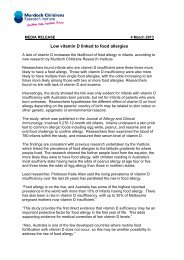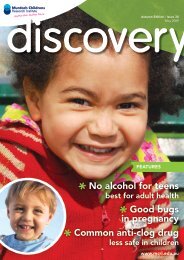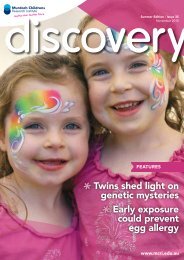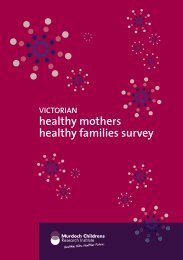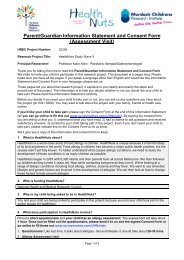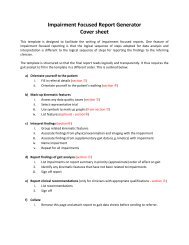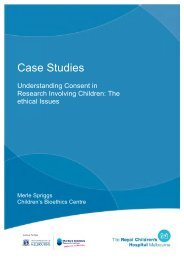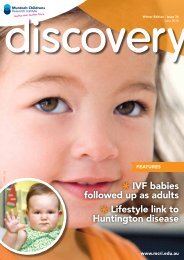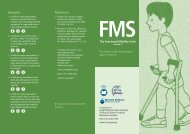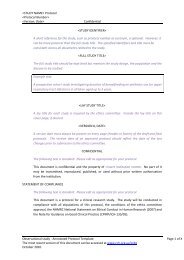Case studies: - Murdoch Childrens Research Institute
Case studies: - Murdoch Childrens Research Institute
Case studies: - Murdoch Childrens Research Institute
Create successful ePaper yourself
Turn your PDF publications into a flip-book with our unique Google optimized e-Paper software.
CASE 2<br />
[Fictitious case]<br />
Consent issues in research involving MySpace<br />
Sixteen-year-old Sophie has chosen the option to set her MySpace profile to public<br />
viewing. She has filled in the ‘about me’, and ‘I’d like to meet’ areas of her profile<br />
and has included requests to ‘E-mail me’. Her profile is intentionally constructed in<br />
the hope of receiving feedback from those who view it.<br />
A researcher is conducting a study on bullying at school and young people’s<br />
experience of it. He is recruiting and collecting data via the internet from children<br />
and young people aged 12 to 16. In the first stage of the study he proposes to<br />
collect data from what is posted on Sophie’s MySpace site without Sophie’s consent<br />
and without parental consent. In the second stage of the study, the researcher plans<br />
to post/email questions for Sophie to answer i.e. to generate new data. The<br />
researcher will sign up as Sophie’s friend and then, if accepted, will post questions<br />
for her to answer, without making clear that this is research.<br />
Questions:<br />
First stage of project:<br />
1. Is Human <strong>Research</strong> Ethics Committee (HREC) approval needed?<br />
Comments:<br />
*This is a new research area. There are no detailed or universally accepted ethics<br />
guidelines.<br />
In the National Statement, internet-based research fits the description of<br />
human research. <strong>Research</strong> is an “investigation undertaken to gain<br />
knowledge and understanding” and human research is “research conducted<br />
with or about people, or their data.” 4 Institutions are required to see that any<br />
human research they conduct or for which they are responsible is “ethically<br />
reviewed and monitored in accordance with the National Statement”<br />
[5.1.1.(b)]. However, research that “is negligible risk research” and “involves<br />
the use of existing collections of data or records that contain only nonidentifiable<br />
data about human beings” can be exempted from review<br />
[5.1.22]. According to the National Statement, in deciding to exempt<br />
research from ethical review, institutions “must recognise” that they are<br />
“determining that the research meets the requirements of the National<br />
Statement and is ethically acceptable [5.1.23]. <strong>Research</strong>ers are required to<br />
4 National Health and Medical <strong>Research</strong> Council, Australian <strong>Research</strong> Council, Australian Vice-Chancellors’<br />
Committee [Internet]. National Statement on Ethical conduct in Human <strong>Research</strong>. Canberra: Australian Government;<br />
2007. Available from http://www.nhmrc.gov.au/publications/synopses/_files/e72.pdf p.101 and p.3.<br />
<strong>Case</strong> Studies 5



